Share

Paraplanners' Assembly
A bite-sized Assembly on sequencing risk
Season 1, Ep. 23
•
In the third episode of his series of bite-sized Assembly on investing, Timeline’s Laurentius van den Worm takes on the topic of sequencing risk.
In just 15 minutes he offers a working definition of sequencing risk he brings the topic to life with an example of two fictional sisters who – despite enjoying identical returns over their 30-year retirement journey – experience starkly different levels of income during…all because of the consequences of sequencing risk.
What’s more, Laurentius explores pound cost averaging and ravaging as well as the ‘4% rule’.
For paraplanners keen to top up on your investment know-how, it’s the ideal lunchtime listen.
More episodes
View all episodes

5. What can the professional bodies do for you? Part 2
01:02:03||Season 4, Ep. 5Back in November, guests from CISI, PFS and LIBF joined us to talk about what the professional bodies can do for paraplanners.But there was too much to cover in just one session. So we’ve invited Nicola Mellor (PFS), Chris Morris (CISI) and Sally Plant (LIBF) back to pick up where they left off. This time around, they answered questions including which body to join and why, exams and qualifications, the role of CPD and how paraplanners can influence the work of professional bodies. Got questions? Here's your chance to ask.Useful linksCPD: request your certificateWatch this Assembly:Crowdcast Replay (includes Chat)VimeoHere's the event page with all the details and links:What can the professional bodies do for you? Part 2Here are links to each of the professional bodies:CISIPFSLIBFListen to the first part of this Assembly recorded back in November 2025:Podcast: What can professional bodies do for you? Part 1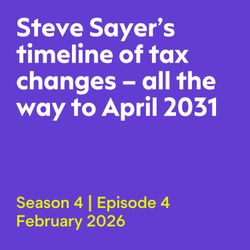
4. Steve Sayer’s timeline of tax changes – all the way to April 2031
34:28||Season 4, Ep. 4We’ve been recording ‘Technically speaking’ sessions with Utmost’s Steve Sayer for a few years now.And because they offer really crunchy case-study based content, they’re really popular with paraplanners. But we like to plan ahead so late last year, we sat down with Steve and the team at Utmost to talk about the ‘Technically speaking’ plans for 2026. During the conversation, Steve talked about each of the major tax planning milestones that stem from the measures announced by the Chancellor since October 2024 and stretch ahead to 2031.And when Steve revealed that he had a single slide that set out each of the changes against a timeline, we decided – there and then – that was definitely something paraplanners would like to hear more about.So we invited Steve into the studio to talk us through it.And here’s the result: Steve Sayer’s guide to the tax change timeline until April 2031. In it, Steve covers inheritance tax and the domicile regime, excluded property trusts and the new foreign income and gains regime, the agricultural and business property relief changes, pension death benefits in 2027, plus the effects of the freezing of tax bands until 2031.Plus you can download his slide using the link below.Useful linksDownload: Steve's timeline of tax changesVideo: Watch at our websiteUtmost Technical Academy webinar seriesUtmost x Paraplanners' Assembly: all our previous sessions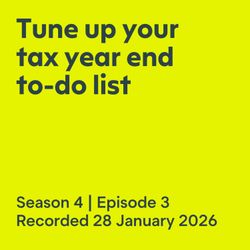
3. Tune up your tax year end to-do list
01:01:06||Season 4, Ep. 3How are you feeling about this year’s tax year end?Whether you’re already deep in the detail or still getting your head around everything that’s changed or going to change, one thing’s certain: there’s plenty to think about.From pension allowances and ISA planning to the upcoming changes to Business Relief and Agricultural Relief, the list of considerations for clients seems longer than ever. And that’s before we get to CGT, investment bonds, salary sacrifice, and all those tax traps lurking around child benefit and personal allowances.A chance to get ahead before AprilWe were joined by M&G’s Mark Devlin for a practical run-through of everything paraplanners should be considering in the lead-up to tax year end.It wasn’t isn’t about theory. It was about making sure you’re thinking about the right things for the right clients at the right time.During this Assembly we covered:making sure the right allowances are being used for clients across pensions, investments and IHTwhat you need to think about for small business clientsBed & ISA opportunitiesinvestment bonds, including whether it’s time to turn offshore bonds onshoreCGT considerations and rebalancingthe April 2026 changes to Business Relief and Agricultural Reliefmoving unwrapped investmentstax traps around child benefit, personal allowance and childcare allowancesalary and bonus sacrificeWatch and you'll gain a clearer picture of what to prioritise before April, practical prompts to check you’re not missing anything for your clients, and the confidence that comes from knowing you’ve thought it all through.Sound useful? Catch up now.Useful linksCPD: Request your certificateWatch the replay at Crowdcast (with chat)M&G Tax Year End hubM&G tools and calculators Visit 'Tune up your tax year end to-do list' event page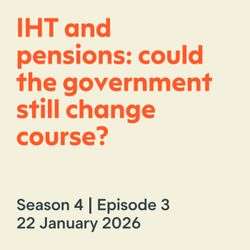
2. IHT and pensions: could the government still change course?
13:07||Season 4, Ep. 2The Government's Finance Bill which includes the provision for pensions to become subject to inheritance tax (IHT) has reached a critical point in its progress through Parliament.But as James Jones-Tinsley from Barnett Waddingham explains in this 15-minute briefing recorded especially for the Paraplanners’ Assembly, the measure isn’t necessarily a done deal.He suggests that the government’s recent decision to raise its proposed threshold on agricultural and business property relief from £1 million to £2.5 million indicates that the government can be persuaded to rethink its plans.So the next few weeks matter. And that’s why James is encouraging advice professionals and clients to write to their MPs – not least to encourage the government to consider the practical consequences of its planned changes. For instance, James asks, how reasonable and realistic is it to expect personal representatives, many who are likely to be recently bereaved family members, to successfully negotiate their way through complex pension death benefit rules against the clock?And is adding to the anxiety of family members worth it when the government's own projections suggest this will raise £1.5 billion by 2029-30 – a fraction of the £6 billion that is already being collected thanks to freezing of the threshold?If you want to know the latest on the progress of the law resulting from last November’s budget and its consequence for advice colleagues and clients, then you’re in the right place.Speaking of the Finance Bill…If you’ve ever wondered how Budget measures become law, James met up with Leanne Pickering of Pivotal Paraplanning back in 2024 to walk through each step in the process. Here's the podcast episode:From Parliament to paraplanner: How do Budget measures become law?And speaking of pensions…James has recorded a series of really helpful jargon busters on new and old pensions exclusively for the Assembly:New pensions jargon: part oneListen: A plain English guide to new pensions jargon: part oneWatch: A plain English guide to old pensions jargon: part oneNew pension jargon: part twoListen: A plain English guide to new pensions jargon: part twoWatch: A plain English guide to old pensions jargon: part twoOld pensions jargon: parts one, two and threeListen: A plain English guide to old pensions jargon: part oneWatch: A plain English guide to old pensions jargon: part oneListen: A plain English guide to old pensions jargon: part twoWatch: A plain English guide to old pensions jargon: part twoListen: A plain English guide to old pensions jargon: part threeWatch: A plain English guide to old pensions jargon: part three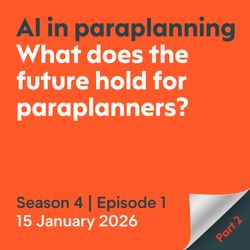
1. AI in paraplanning: what does the future hold for paraplanners?
20:39||Season 4, Ep. 1In the second of her two-part special on AI in paraplanning, Zara Okoro asks where we are heading as a profession. What plans are AI tool providers and financial planning practices likely to pursue in future? And what could it mean for the role of paraplanner itself?In conversation with Benjamin Fabi of Principled Paraplanning, Aram Kupelian of Holden and Partners, Jonny Stubbs of Brooks Financial, and Ben Wright of Melo, Zara asks how far and fast AI adoption should go, what could go wrong, and what needs to happen to get this right?Our last episode looked at where AI in paraplanning stands today.In this concluding episode, we're looking ahead.Useful links and downloadsAs well as links to the podcast episode on Spotify, Apple and Acast, we’ve included downloads of Harriet Mayer’s slides on AI and paraplanning from The Big Day Out in 2025, and Harriet’s glossary of AI terms too.Spotify: Listen to Part OneApple: Listen to Part OneAcast: Listen to Part OneDownload: Glossary of AI termsDownload Harriet's slides: An introduction to AI for paraplanners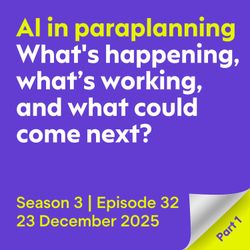
32. AI in paraplanning: what's happening, what's working, and what could come next?
28:00||Season 3, Ep. 32In the first of a two-part special on AI in paraplanning, Zara Okoro hears about the tools paraplanners are using now, the ways they’re being adopted, and the boundaries practitioners are drawing when it comes to their use.In conversation with Benjamin Fabi of Principled Paraplanning, Aram Kupelian of Holden and Partners, Jonny Stubbs of Brooks Financial, and Ben Wright of Melo, Zara discovers how AI is already influencing multiple parts of day-to-day work that will be very familiar to paraplanners, such as meeting notes, research and collaboration.But we also hear about reasons for caution: concerns about accuracy, security, and the pace of change.What is clear is that we’re at the beginning of widespread adoption of AI tools in paraplanning. And no matter how much exposure you’ve had to AI at work so far, this episode (and the next) make for essential listening to understand what’s happening to paraplanning now and in the future.Useful links and downloadsAs well as links to the podcast episode on Spotify, Apple and Acast, we’ve included downloads of Harriet Mayer’s slides on AI and paraplanning from The Big Day Out in 2025, and Harriet’s glossary of AI terms too.Spotify: Listen to the podcast episodeApple: Listen to the podcast episodePodcast: Listen to the podcast episodeDownload: Glossary of AI termsDownload Harriet's slides: An introduction to AI for paraplanners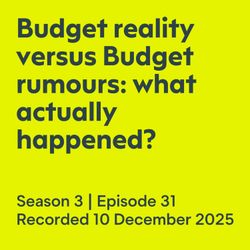
31. Budget reality versus Budget rumours: what actually happened?
01:00:09||Season 3, Ep. 31Budget measures are often the subject of media speculation. But the level of attention in the run-up to the Chancellor of the Exchequer’s Budget statement on 26 November 2025 was unprecedented.So did the reality match the hype? For our final Assembly of 2025, we invited Les Cameron from M&G Wealth to join us and share his latest thoughts on what paraplanners need to know following Rachel Reeves’s statement.Les covers a bunch of different topics that include:Inheritance tax changes and business relief updatesCapital gains tax rates and allowancesISA allowancesPensions, IHT liability and the role of personal representativesSalary sacrificeTax rates, bands and allowancesBeneficial orderingThe effect of fiscal drag (or ‘stealth taxes’)Plus more besides. So if you want to catch up with what's been announced, what's changing, or what's staying the same, this is the Assembly for you.Assemblies featuring the M&G technical team in 2025This is the fifth Assembly of the year featuring experts from M&G Wealth's technical team. Here are the other four from 2025:February 2025 – Pensions, death and taxes (with Les)April 2025 – A guide to investment bond essentials for paraplanners (with Barrie Dawson)August 2025 – Tax wrappers: which, why and when? (with Neil Macleod)September 2025 – The pension IHT bombshell has landed – now what? (with Les)Useful linksCPD: Request your certificateDownload: Les's slidesWatch the replay at Crowdcast (with chat)Listen to the podcast episode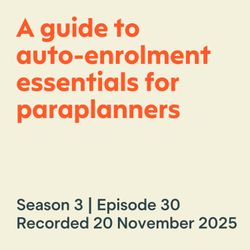
30. A guide to auto-enrolment essentials for paraplanners
23:13||Season 3, Ep. 30It’s been more than a decade since auto-enrolment in workplace pensions was first introduced by the UK Government.And it’s fair to say that the measure has transformed the level of pension saving in the workplace. Plus it’s transformed the role that businesses (and their owners) can play in the financial wellbeing of their employees.Mind you, there are plenty of paraplanners who weren’t around when auto-enrolment was rolled out. Or when the Pensions Commission was formed in 2005. Or when personal pensions were launched in 1988. So in this bonus Assembly episode, we asked Barnett Waddingham’s DC pension and employee benefits expert, Lucy Clark, to provide paraplanners - whatever your level of expertise - with a primer on the origins of workplace pensions, auto-enrolment and where things might be going in the future. In just 20 minutes, Lucy provides a potted history of personal pensions, stakeholder pensions, why the original Pensions Commission was formed and its legacy.What’s more, Lucy walks through the employer duties that need to happen each pay period and the common pitfalls she sees in practice (contribution deductions and certification crop up a lot). She offers a helpful explanation of the net pay anomaly that's affected lower earners in occupational schemes and – this is a new one for us – Lucy talks about 'sidecar savings': an idea that could help people build emergency funds alongside their pension in future.Speaking of the future, Lucy also considers what it might hold. We're talking potential changes to age thresholds, removing the lower earnings limit, and the ongoing push for contribution adequacy.This is a fantastic backgrounder packed with knowledge, know-how and insight from a DC pension and employee benefits expert. Useful linksHere are the slides that Lucy ran through during her conversation with Richard.Download: Lucy's slides Listen to the podcast episode
29. What can the professional bodies do for you?
01:00:36||Season 3, Ep. 29As paraplanners, many of us hold memberships with Chartered Institute for Securities and Investment (CISI), Personal Finance Society (PFS), or pay for LIBF courses.So we pay our fees, collect our CPD, and maybe sit an exam or two. But are we really getting the most from these organisations? What do they offer that can support us in our careers? And is one more suited to me than another? Or are all three much the same?That’s what this Assembly was all about. We invited Chris Morris from CISI, Nicola Mellor from the PFS, and Sally Plant from LIBF to field questions posed in advance and in the chat by paraplanners.Note: Because technology didn’t work the way it’s supposed to, Sally wasn’t able to join us on screen BUT she did join us in the Chat while her colleague (and director of financial services at the LIBF) John Somerville, was able to join Richard, Chris and Nicola on screen (from about 15 minutes in).It’s a great conversation from start to finish and comprehensively explored:What specific support does each body offer paraplanners – and what makes the difference between themHow can paraplanners influence the work of the organisations and how to get involvedWhether there’s a place for paraplanner-specific qualificationsHow does membership work, what are the costs involved, and why do you need to maintain a membership (for PFS and CISI)Plus plenty more.What can you expect to take away?Once you’ve listened or watched, you’ll have a much clearer understanding of what each professional body offers, which could be the right one for you, and how you can get more value from your membership.Look out for another installment in 2026There was so much to talk about that we didn’t manage to address even 50% of the questions that paraplanners had submitted so we’ll be setting up a second session featuring Chris, Nicola and - hopefully - Sally early in 2026.Useful linksWatch the Replay at Crowdcast (with Chat)CPD: Request your certificateCISI’s websitePFS’s websiteLIBF’s website